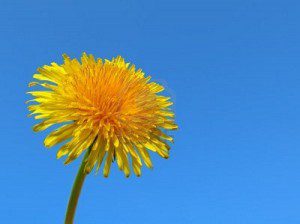Contributing Writers for Wake Up World
While many people view the dandelion (Taraxacum officinale) as a pesky weed, many herbalists consider it to be a valuable herb for food and medicine. The dandelion is rich in vitamin A, B, C, and E as well as minerals such as iron, potassium calcium and zinc. Hundreds of species of dandelion grow in the temperate regions around the world.
The Dandelion is a hardy perennial that can grow to a height of nearly 12 inches. They have deeply notched, toothy, spatula-like leaves that are shiny and hairless which help funnel rain into the root and the stems are capped by bright yellow flowers. Contrary to what we have been told, dandelions offer us many health promoting nutrients.
[pro_ad_display_adzone id=”110028″]
Food
All parts of the common dandelion are edible. Young leaves have been used in salads or served hot as a cooked vegetable – scalloped, baked or added to meat dishes or soups. They can also be mixed in a blender with tomato juice to make a vitamin rich cold drink. The older leaves or leaves growing in the sun are much more bitter. This bitterness can be reduced by growing the plant away form he sun or by boiling the leaves in at least 2 changes of water. The roots (preferably dug up in the spring or fall) have been used as a cooked vegetable (similar to parsnips). They traditionally have been peeled, sliced, and cooked in two changes of water with a pinch of baking soda. Dandelion roots can also be used in raw salads, or can be dried, roasted slowly until dark brown throughout and ground to make a coffee substitute. The flower petals produce a delicate flavored, pale yellow wine. They can also make a pretty addition to pancakes. Unopened buds can be eaten in raw salads, cooked in pancakes and fritters or pickled. The chewy seeds (without the fluffy parachute) have been eaten as a nibble, ground into flour or used to grow sprouts.
Medicine
Dandelions are rich in vitamins A, C, E and B complex, iron, calcium, magnesium, potassium and zinc. Dandelions are also one of the highest sources of vitamin K1. Dandelion root or leaf was recommended as a mild laxative that would also stimulate urination, salivation and the secretion of gastric juices and bile, improve appetite and generally tone the whole system. It has been used to treat liver, urinary tract and digestive problems. The roots have been reported to lover blood sugar and cholesterol levels, lower blood pressure, reduce inflammation, have anti microbial effects (against Candida albicans in particular) and aid weight loss. They also contain the sugar inulin, which is said to be an immune system stimulant. Historically, dandelion flowers were used to treat jaundice and other liver ailments, perhaps because of their yellow colour. Recently, they have been shown to contain large amounts of lecithin, which has been shown to prevent cirrhosis in chimpanzees. The milky juice, applied 3 times daily for 7-10 days, was said to kill warts.
Other Uses
Dandelion leaves can be used as a substitute for mulberry leaves for feeding silk worms. The flowers produce a yellow dye, and the roots give a magenta colour. When collecting dandelions always ensure that you don’t collect the plant from an area that might have been sprayed with herbicides. The milky sap can cause rashes on sensitive skin.
We are slowly reconnecting to the knowledge we once knew. Let us use the teachings of the past as well as our instincts and intuitions to guide our way. There is a purpose to everything. Let us bring our awareness back into this understanding. Be sure to stay tuned for all our other articles on Medicinal Plants. For more information, please check-out our book page for some great books on the topic.
Sources:
1. Edible & Medicinal Plants of Canada; MacKinnon, Kershaw, Arnason, Owen, Karst, Hamersley, Chambers.
About the Authors
Jordan and Kyla are passionate about health; together, they have overcome many illnesses through dietary and lifestyle changes, and the art of practicing a positive mindset daily. Kyla is currently studying to become a Registered Holistic Nutritionist and Reiki Master, and Jordan is currently learning about traditional North American medicinal herbs, in hopes of becoming a Certified Herbalist. For more information, please visit the following sites; guidinginstincts.com, Facebook, Twitter, Google+, or Pinterest
[pro_ad_display_adzone id=”110027″]







